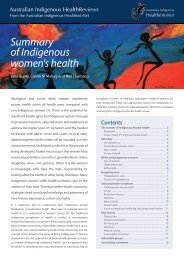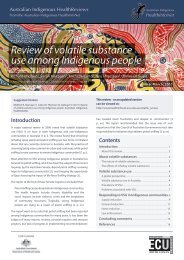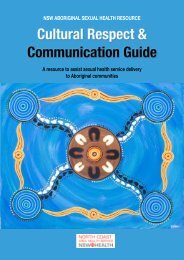hearing loss and the criminal justice system - Australian Indigenous ...
hearing loss and the criminal justice system - Australian Indigenous ...
hearing loss and the criminal justice system - Australian Indigenous ...
Create successful ePaper yourself
Turn your PDF publications into a flip-book with our unique Google optimized e-Paper software.
Senate Inquiry March 2010_________________________________________________________________________________________________________________WHY THE ADVERSE OUTCOMES OF CONDUCTIVE HEARING LOSSREMAINS AN INVISIBLE, NEGLECTED ISSUECurrent services for <strong>hearing</strong> impaired children generally ignore <strong>the</strong> needs of <strong>the</strong> manychildren with mild to moderate <strong>hearing</strong> <strong>loss</strong>. The reasons for this are diverse. Thedifficulties of those with more severe levels of permanent Conductive Hearing Loss (thosewho are deaf/Deaf) are obvious. In contrast, those who have less <strong>hearing</strong> impairment, whoare hard‐of‐<strong>hearing</strong>, often attempt to simply ‘get by’ in a <strong>hearing</strong> world, or are evenunaware of <strong>the</strong>ir disability. It is common for adults with mild to moderate ConductiveHearing Loss to not disclose to o<strong>the</strong>rs that <strong>the</strong>y have a <strong>loss</strong>, despite often experiencingsignificant communication problems (Stika, 2000).The vast majority of children with <strong>hearing</strong> <strong>loss</strong> that teachers will encounter are those with amild to moderate Conductive Hearing Loss, although usually <strong>the</strong> teachers will be unawarewhich children have such a <strong>hearing</strong> <strong>loss</strong>. This fluctuating Conductive Hearing Loss amongchildren is often not identified unless <strong>the</strong>re are school screening programs, which, allaround Australia, are being carried out less often. The invisibility of <strong>the</strong> problem makes itdifficult to gain <strong>the</strong> attention of policy makers. The current vogue of market driveneducational policy making also compounds this.Connell (1993) makes an important point abouteducational policy being driven by a marketideology. That is, influential sectors of <strong>the</strong>community drive <strong>the</strong> policy agenda ofgovernments. Market driven policy empowers<strong>the</strong> advantaged. It acts to consolidate <strong>the</strong>marginalisation of those who have low ‘marketpower’ because of low numbers or low resourceswhich limit <strong>the</strong> opportunity to self‐advocate.This means that <strong>Indigenous</strong> people, who in <strong>the</strong><strong>Indigenous</strong> people who in <strong>the</strong> pasthave been dispossessed <strong>and</strong>oppressed at <strong>the</strong> h<strong>and</strong>s of aninterventionist state bent onassimilation, are now ab<strong>and</strong>onedby a newly regretful state to <strong>the</strong>untender mercies of market drivenpolicy.past have been dispossessed <strong>and</strong> oppressed at <strong>the</strong> h<strong>and</strong>s of an interventionist state bent onassimilation, are now ab<strong>and</strong>oned, by a newly regretful state, to <strong>the</strong> untender mercies ofmarket driven policy.<strong>Indigenous</strong> Conductive Hearing Loss is vulnerable to being neglected as a policy priority as itis often an invisible impairment that most affects those sections of <strong>the</strong> community with <strong>the</strong>least power to advocate on <strong>the</strong>ir own behalf.Multiple o<strong>the</strong>r areas ofdisadvantage … exacerbate <strong>the</strong>adverse outcomes from <strong>hearing</strong><strong>loss</strong>.The multiple o<strong>the</strong>r areas of disadvantage that areexperienced by <strong>Indigenous</strong> people <strong>and</strong> are known toexacerbate <strong>the</strong> adverse outcomes from ConductiveHearing Loss, act toge<strong>the</strong>r to create a cocktail ofdisadvantage.The training undergone by audiologists <strong>and</strong> those who specialise in teaching <strong>the</strong> <strong>hearing</strong>impaired, provides very little information on, or support strategies for, <strong>the</strong> many childrenwho experience inconsistent mild to moderate Conductive Hearing Loss during <strong>the</strong>ir schoolyears. This results in difficulties in developing effective educational programs for childrenwith this type of <strong>hearing</strong> <strong>loss</strong>._________________________________________________________________________________________________________________41 Phoenix Consulting








